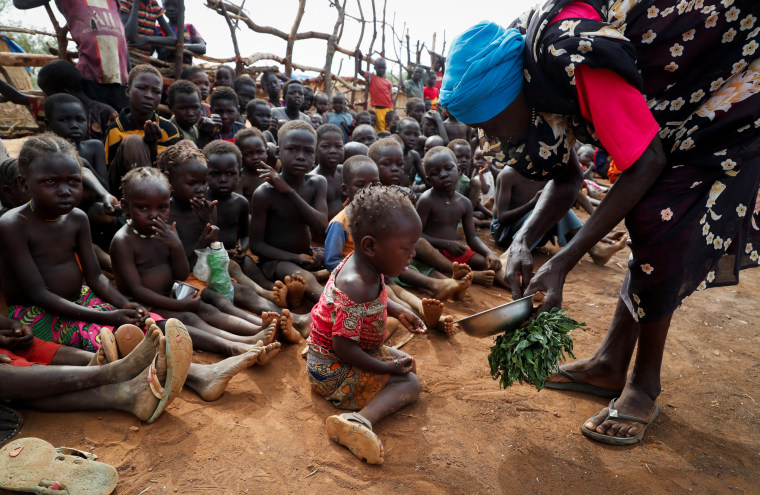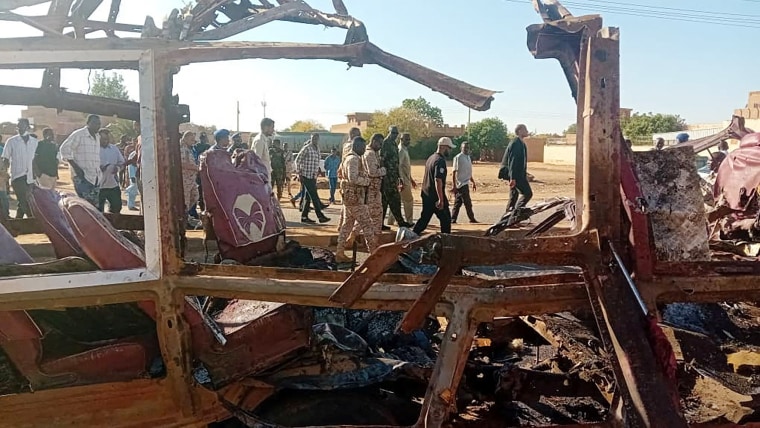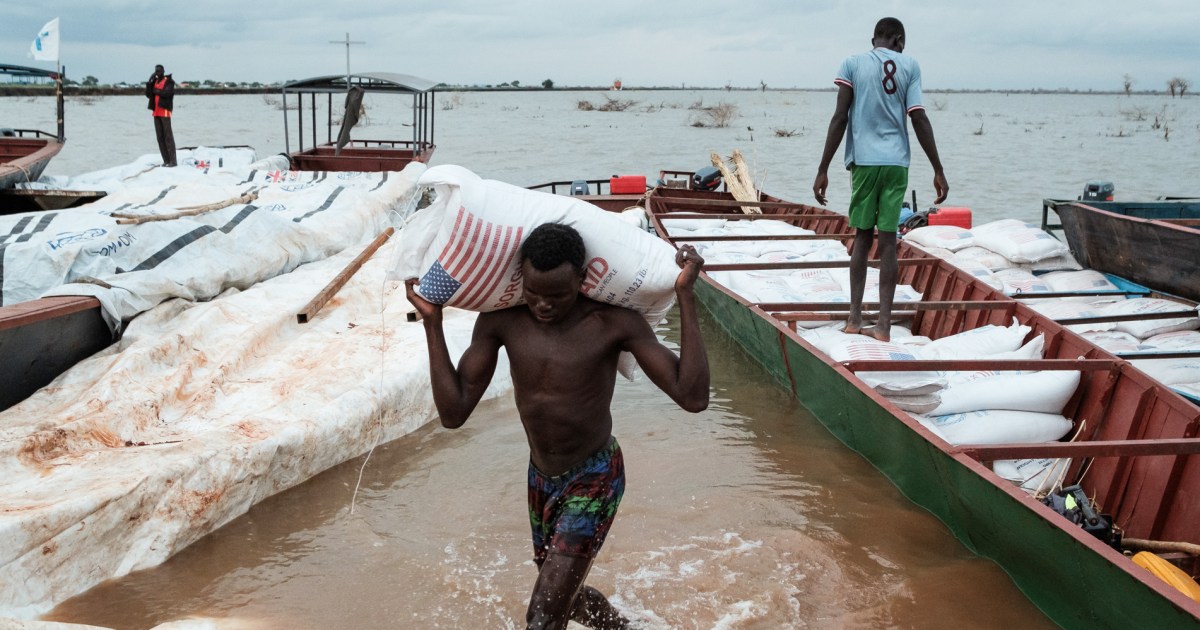Ravaged by two years of brutal civil war and with over 30 million people — or more than half of the population — in need of humanitarian assistance, President Donald Trump’s 90-day freeze on all foreign aid could not have come at a worse time for Sudan.
As battles rage in the North African country, a network of communal kitchens has had to immediately stop most of its operations due to a lack of funding, about 75% of which came from the U.S. Agency for International Development (USAID), according to their organizers.
Part of Sudan’s Emergency Response Rooms (ERRs) — a civilian-led, grassroots effort to provide humanitarian support — the kitchens have been able to provide food, medicine and other basic supplies to people in parts of the country unreachable by aid agencies.
Without the American funding “a lot of people will die because of hunger,” Abuzar Osman Suliman, the coordinator of the ERRs in Sudan’s western Darfur region, told NBC News on Friday.
Suliman, who said it cost $10,000 for a single kitchen in Darfur to feed 250 families for two weeks, gave a 10 to 20 day window for people to start dying.

Trump signed an executive order on Jan. 20 freezing foreign assistance, forcing American-funded aid and development programs worldwide to shut down and lay off staff.
Secretary of State Marco Rubio said he had sought to mitigate the damage by issuing a waiver to exempt emergency food aid and “life-saving” programs, but USAID officials and aid groups say neither funding nor staffing have been reinstated in order to allow even the most essential programs to start working again.
In Sudan, Suliman said all 40 of ERRs’ community kitchens had to close in Darfur’s Zamzam camp, where more than 1 million displaced people have sought refuge from the conflict between the country’s two main warring powers — the Sudanese Armed Forces controlled by the country’s top commander and de facto ruler, Gen. Abdel Fattah Burhan, and the Rapid Support Forces (RSF) militia, led by his former deputy, Gen. Mohammed Hamdan Dagalo.
Once allies, both men were part of the military establishment that seized power following the collapse of the Western-backed government of Prime Minister Abdalla Hamdok in 2021. But although they agreed to rule together, their alliance spectacularly broke down over how to manage the transition to a civilian government. With neither willing to cede power, war broke out in April 2023.
Because of intense fighting and an ongoing RSF siege in the surrounding area, U.N. agencies have been unable to get substantial amounts of food relief to the Zamzam camp and a famine was declared in the camps in August, according to an analysis by the Integrated Food Security Phase Classification (IPC), an international system that sets a scale used by the United Nations and governments. So people are now facing the choice between staying in the camp to die because of hunger, or to risk their lives by moving through Darfur areas besieged by the RSF, Suliman said.
Famine has since spread to four other areas of Sudan, according to the IPC, and is expected to deepen and spread in coming months due to the war and impeded access to humanitarian assistance.

In Sudan’s capital, Khartoum, intense block-by-block fighting has made aid delivery almost impossible.
The World Food Program said it was only able to deliver its first shipment in December, 17 months after the conflict erupted, and even then, it said it had to rely on the ERRs for distribution.
Across Khartoum, the ERRs were operating 742 kitchens and serving around 816,000 people before Trump’s executive order, but now 80% of those kitchens have closed, according to Hajooj Kuka, an external communications officer for the Emergency Response Rooms.
In a country riven by ethnic and political divisions, the ERRs have espoused neutrality and solidarity, allowing them to operate in areas controlled by SAF as well as the RSF, leveraging local know-how to navigate hostile terrain.
The kitchens are organized locally and entirely volunteer-led, Kuka said, adding the whole ERR system was run by housewives, doctors, engineers, electricians, “just everybody.”
“This minute, I’m trying to save the lives of the people in the district and the volunteers,” he said in an interview Friday. “I’m just, like, going crazy trying to get any money.”
Without immediate funding, famine could take hold in the city, he added.
Because USAID was often distributing money through other nongovernmental organizations working in Sudan, Kuka said the ERR organizers weren’t always aware of how crucial USAID was to their funding, until the money was taken away.
On Friday, Kuka said he found out that a $50,000 grant he expected from the Baltimore-based Catholic Relief Services (CRS) had been suddenly cancelled because of the U.S. freeze.
The humanitarian agency told NBC News they could not comment on the grant cancellation.
CRS, which has about 5,000 employees, told staffers last week to expect layoffs because of the administration’s cuts to their foreign aid grants, according to Reuters. The organization has a $1.5 billion budget, about half of it funded by USAID.
Across Sudan, the cost of operating the kitchens was around $20 million a year, the ERR communications officer said. But the localized, ad-hoc nature of the work is also what made them so vulnerable to U.S. funding cuts, Kuka added.
While U.N. agencies may have several months of supplies in the pipeline, the ERRs often relied on purchasing goods directly from local markets. So when the cash flow was cut off, the kitchens could no longer buy and cook food.
Andrea Tracy, a former USAID official and country representative in Sudan, said the exemption issued by Secretary Rubio was “very complicated, nobody really knows how it works.”
Tracy, who is currently vice president of Proximity 2 Humanity, a nonprofit working to shore up funding for Sudan’s ERRs, added that some agencies might be big enough to continue operations, relying on a future reimbursement if an exemption is granted, but a lot of smaller organizations can’t do that.
On Friday, a federal judge paused an order putting USAID staff on administrative leave, but Tracy said it is still not clear to what capacity the agency will be able to operate.
“In theory they have a week where they’re able to work again —access to emails, etc. — but what they could do before this was heavily curtailed, so unclear as to how much they can do, like make payments.”
Kuka said he is also appealing to any other institutional donors to fill in the funding gaps, using what little they have left to support emergency assistance programs.
“After a month, it will be completely done,” he said.








